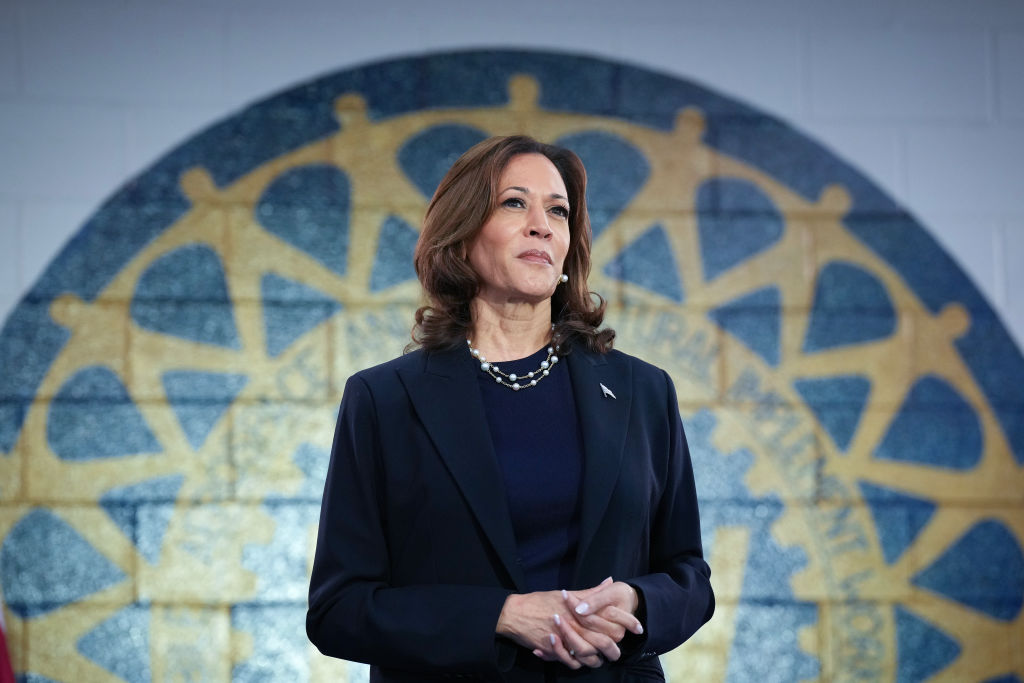What impact could Kamala Harris have on markets?
Kamala Harris and markets – will she be good for your money?

Katie Williams

Get the latest financial news, insights and expert analysis from our award-winning MoneyWeek team, to help you understand what really matters when it comes to your finances.
You are now subscribed
Your newsletter sign-up was successful
Want to add more newsletters?

Twice daily
MoneyWeek
Get the latest financial news, insights and expert analysis from our award-winning MoneyWeek team, to help you understand what really matters when it comes to your finances.

Four times a week
Look After My Bills
Sign up to our free money-saving newsletter, filled with the latest news and expert advice to help you find the best tips and deals for managing your bills. Start saving today!
Kamala Harris, currently serving as the 49th Vice President of the United States under the Biden administration, is now formally the Democratic Presidential nominee. Harris’ extensive career includes roles as the District Attorney of San Francisco, Attorney General of California, and a United States Senator.
Known for her online presence, she has been referred to as “Brat” and a “Feminominom,” social media “in-jokes” that indicate her widespread appeal with groups as far apart as Gen Z TikTok influencers and Nancy Pelosi, the octogenarian former speaker of the House of Representatives. After the presidential debate between Harris and Donald Trump on 10 September, pop megastar Taylor Swift waded into the conversation, revealing that she would be voting for Harris in the upcoming election. Swift called Harris a "gifted leader" before signing her post off as a "Childless Cat Lady" — a dig at comments made by Donald Trump’s running mate JD Vance, which were widely criticised as sexist.
Electing a female president would be a landmark event in US history. US women have had the right to vote since 1920, but have only participated in 104 of the 236 years of presidential elections. We’ve seen female leaders in countries as far and wide as Italy, New Zealand, India and of course, the UK, but the US has never had a female President. Hilary Clinton came closest in 2016, winning the popular vote but not the crucial electoral college.
MoneyWeek
Subscribe to MoneyWeek today and get your first six magazine issues absolutely FREE

Sign up to Money Morning
Don't miss the latest investment and personal finances news, market analysis, plus money-saving tips with our free twice-daily newsletter
Don't miss the latest investment and personal finances news, market analysis, plus money-saving tips with our free twice-daily newsletter
The historical significance of electing the first female president would profoundly impact the US and its history, inspiring future generations and potentially shifting societal norms. The pay gap and the pension gap between genders are frequently discussed, but the "dream gap" — where young girls lose interest in leadership roles as early as age six due to a lack of representation — is equally damaging both to equality and to overall company/country performance. Research by McKinsey shows that diversity in leadership (of all kinds) drives better performance. They state “the business case for diversity, equity, and inclusion (DEI) not only holds, but grows even stronger”.
What type of stock market will the next president inherit?
The stock market's performance is influenced by various factors, including policy stances and fiscal impacts, but the stock market is not the economy.
Earnings growth, often driven by an expanding economy, is a significant factor for market rallies. Currently, AI and technology stocks dominate the narrative, with the S&P 500 up 14.54% year-to-date, and the technology sector, which constitutes 31.34% of the S&P 500, up 23.03%.
Economic policies operate with long and variable lags, meaning their full impact may not be immediately visible. Therefore, the incoming President will need to navigate a complex landscape where policy decisions and market dynamics interplay in shaping the stock market's future trajectory.
Sector performance overview
The following data provides a snapshot of year-to-date (YTD) performance and market weight of various sectors as of market close 30 July 30, 2024:
| Sector | YTD Performance % | Market Weight |
|---|---|---|
| Technology | 23.03% | 31.34% |
| Comm Services | 19.12% | 8.75% |
| Financials | 15.00% | 13.10% |
| S&P 500 | 14.54% | Benchmark |
| Utilities | 12.79% | 2.36% |
| Industrials | 10.59% | 8.42% |
| Staples | 10.40% | 5.92% |
| Healthcare | 9.89% | 12.03% |
| Energy | 9.16% | 3.70% |
| Materials | 6.85% | 2.25% |
| Discretionary | 5.65% | 9.85% |
| Real Estate | 2.21% | 2.28% |
Regardless of who takes office, the new President will inherit an economy with a cost-of-living crisis. The Federal Reserve (Fed) is likely to cut rates due to deflationary trends in the Personal Consumption Expenditures (PCE) – currently at 2.6% slightly above the Fed’s 2% target (data as of 07/31/2024). Inflation is cooling due to monetary policy and supply chain normalisation. The Fed has acted with a cushion due to above-trend GDP growth, partly supported by fiscal stimulus incentivising U.S. manufacturing. On July 31st, the Federal Open Market Committee (FOMC) left rates unchanged, indicating a shift in focus from inflation cooling to normalising unemployment. If the Fed acts too late, the new President could inherit a very challenging economy and even a recession.
Legislative considerations
Senate and House elections are crucial since Presidents do not have unilateral control. The next Congress will face a full agenda starting January 3rd. It will likely need to address the debt ceiling, which suspends on January 1st, and determine the fate of personal tax cuts from the 2017 Tax Cuts and Jobs Act, set to expire at the end of 2025. While the election brings uncertainty over certain fiscal policies, the outlook for the deficit remains a pressing concern.
Will Kamala Harris be good news for the market?
Artificial intelligence stocks: regulatory impact
AI stocks have been the primary source of earnings growth and market rallies. Kamala Harris has shown a regulatory stance on AI. On October 30, 2023, the Biden-Harris administration signed an executive order directing the Department of Homeland Security (DHS) to lead the responsible development of artificial intelligence. Unlike the European Union, the U.S. lacks comprehensive AI regulations, requiring Congressional action. The market has already reflected this regulatory executive order. However, there is uncertainty, as seen in the recent CrowdStrike process failure impacting banks, hospitals, and airlines. Additional regulation may have a short-term impact on AI-exposed stocks.
Trade policy: potentially deflationary stance
The 10% tariffs imposed by the Trump administration have been costly for taxpayers. Additional tariffs could trigger a trade war or recession. The Biden-Harris administration has favoured targeted tariffs, including tripling the existing 301 tariff rate on Chinese steel and aluminium. Although this initially hurt the semiconductor industry, it has since recovered. These tariffs encourage domestic manufacturing.
EV adoption and clean energy: sector boost
Harris supported the Green New Deal during her 2019 presidential bid, advocating for banning fracking and offshore drilling. The administration initially set ambitious EV adoption targets but reduced them from 67% by 2032 to about half after pushback from the auto industry and labour leaders. Expansion or additional fiscal policy on these stances could reignite the clean energy sector.
Aging population: healthcare cost implications
The Inflation Reduction Act (IRA) included provisions for pharmaceutical negotiations, allowing for reduced out-of-pocket costs and payments to Big Pharma. Implementing additional Medicare drug cost negotiations is deflationary and essential for an ageing population. This might negatively impact big pharma securities, but the overall positive economic impact from increased income could outweigh this. Additionally, private healthcare already negotiates prices.
Tax policy: potential reversal of Trump's cuts
The Tax Cuts and Jobs Act slashed corporate tax rates from 35% to 21%. Harris is likely to reverse some of Trump's tax cuts, though the extent is unclear.
Immigration policy: supporting unemployment data
Federal Reserve Chair Jerome Powell has noted that robust unemployment figures are supported by increased labour market participation and immigration. Harris backed an immigration bipartisan bill impacting labour market data positively. Reversing this could push the U.S. into a recession as an ageing population leaves the workforce.
Affordable housing: inflation control measures
Shelter inflation is cooling but remains elevated. Earlier this month, President Biden called on Congress to pass legislation giving corporate landlords a choice between capping rent increases at 5% or losing valuable federal tax breaks. As a senator, Harris proposed legislation that offered tax credits to households spending more than 30% of their income on rent and utilities, along with a separate bill to allocate over $100 billion towards affordable housing initiatives. While it is unclear if she will pursue similar policies, her past stances suggest possible future impacts.
What could this mean for your investments?
Markets tend to respond more to economic, inflation and earning trends than to election results. Historical data indicates that remaining invested, regardless of the party in power, yields better returns than timing investments based on political leadership.
While the 2024 election will undoubtedly influence the US market, the totality of broader economic factors such as inflation, fiscal policy, and global events will play more significant roles.
Get the latest financial news, insights and expert analysis from our award-winning MoneyWeek team, to help you understand what really matters when it comes to your finances.

Jessica is a finance trailblazer, known for being the first female on Fidelity's Active Trader Desk and work frequently recognized by Jim Cramer. With expertise in advanced trading strategies and technical analysis, she has had a significant impact. Jessica appears frequently on CNBC, FOX Business, Yahoo! Finance and the Schwab Network as a guest and commentator.
Since joining the finance industry in 2009, she has held diverse roles in brokerage firms, specializing in strategic initiatives, high-frequency trading, options, and derivatives. Currently, she is the Director of Investor Research at Stockbrokers.com. Jessica's work is featured in esteemed firms and exchanges such as Fidelity, Merrill, TD, Nasdaq, and more. Alongside her professional endeavours, she actively promotes financial literacy through social media, gaining a dedicated following of over 100,000 advocating for the younger generation. Jessica recently launched the Market MakeHer podcast which has won various awards and is focused on breaking down the complexities of the stock market.
-
 Should you buy an active ETF?
Should you buy an active ETF?ETFs are often mischaracterised as passive products, but they can be a convenient way to add active management to your portfolio
-
 Power up your pension before 5 April – easy ways to save before the tax year end
Power up your pension before 5 April – easy ways to save before the tax year endWith the end of the tax year looming, pension savers currently have a window to review and maximise what’s going into their retirement funds – we look at how